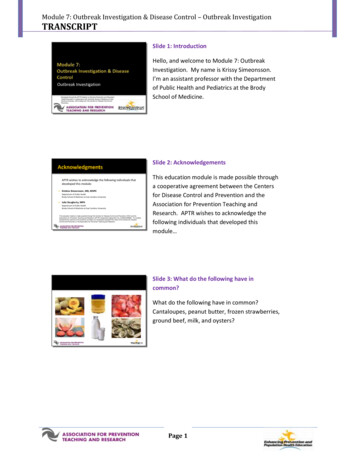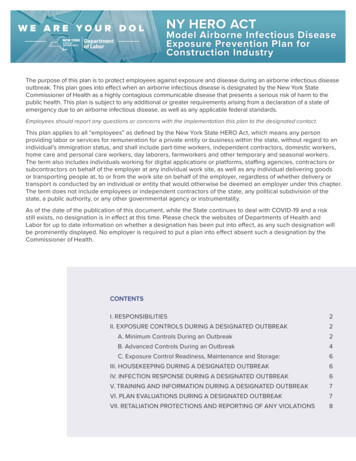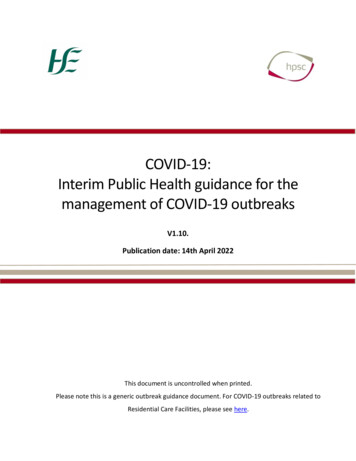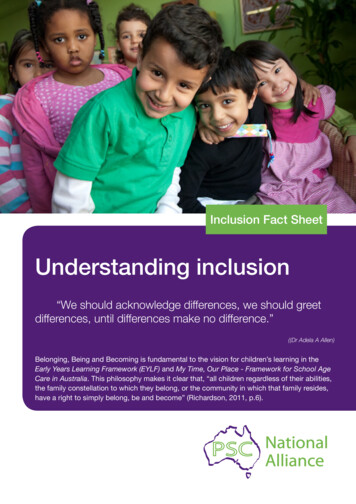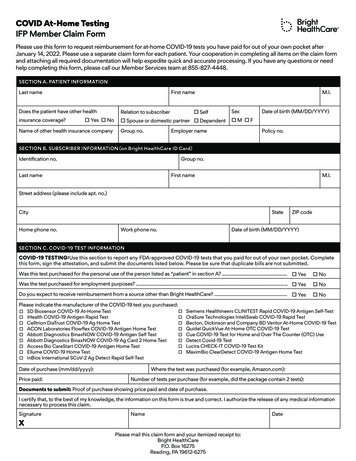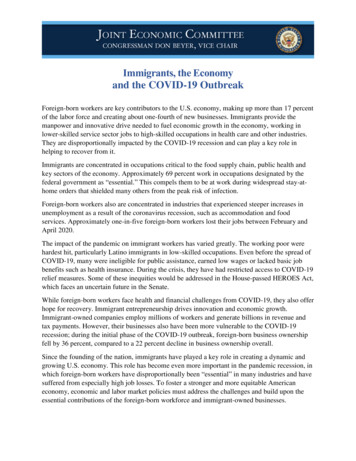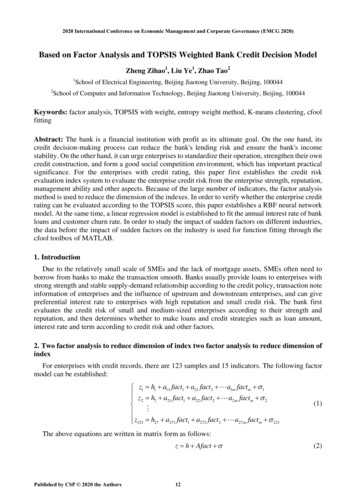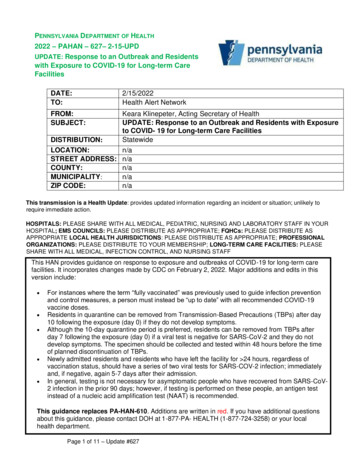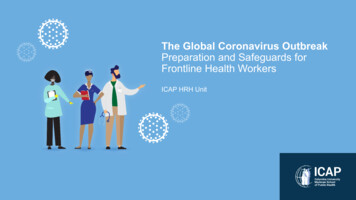
Transcription
Coronavirus (COVID-19): Outbreakpreparedness, prevention andmanagementThis information is intended to support registered NDIS providersto understand how to: ensure their workers take reasonable precautions to protectpeople with disability and themselves prepare for an outbreak of COVID-19 respond to suspected or confirmed cases in different types ofservice settings manage an outbreak of COVID-19.Provider obligationsIn line with your obligations under your conditions of registration, the NDIS Practice Standards and NDISCode of Conduct, you should be planning your response to a potential outbreak of COVID-19, and takingreasonable precautions to minimise infection risks.This information provides guidance to help you meet your obligations and minimise the risk to NDISparticipants’ health, wellbeing and safety.This fact sheet has been endorsed by the Australian Government Department of Health.Keeping the NDIS participants you support safeAll workers should take reasonable precautions to continue to provide supports and services in a safeand competent manner with care and skill and to keep themselves and others safe and must not go towork if they have: returned from overseas or interstate in the last 14 days, consistent with their state or territory’spublic health directions, orbeen in contact with someone diagnosed with COVID-19, ora fever, or any symptoms of acute respiratory illness (e.g. cough, shortness of breath, sorethroat, runny nose or nasal congestion).May 2020
If a worker experiences fever or acute systems of respiratory illness (such as those outlined above), theymust report those symptoms to their place of work. Should a worker experience any of thesesymptoms for the first time during a shift, they should leave work immediately, report their symptomsas identified above, and seek medical advice from their doctor or call the National Coronavirus Hotlineon 1800 020 080.If COVID-19 is excluded, the worker may be able to return to work once well and as guided by medicaladvice regarding the infectious period for their condition.If a diagnosis of COVID-19 is confirmed, the worker must be isolated at home, or hospital depending onthe severity of illness until they have been cleared to return to work by a medical practitioner. Publichealth officials in each state and territory will undertake an investigation to locate any close contactswith the confirmed case to provide advice on self-quarantine and testing. This will include locating anyclose contacts during the 24 hours before the onset of symptoms of the case.Close contact‘Close contact’ is defined as: More than 15 minutes face-to-face contact in any setting with a confirmed (or probable)case in the period from 24 hours before onset of symptoms in the confirmed (or probable)case, orSharing a closed space with a confirmed (or probable) case for a prolonged period (e.g. morethan 2 hours) in the period extending from 24 hours before onset of symptoms in theconfirmed (or probable) case.Preparing for an outbreak of COVID-19Community transmission of COVID-19 is occurring, so NDIS providers should plan and prepare forpossible cases involving the people with disability you work with and/or your workers.As part of business continuity planning for COVID-19, you should consider preparing an outbreakmanagement plan that is proportionate to the risk of supports you deliver, and the size of yourorganisation. This plan may include the following components: Identify which supports are critical for the health, wellbeing and safety of a person withdisability. Decisions on which services are continued, altered, or suspended are based on theassessed risk to the person with disability and in conjunction with relevant state/territory publichealth orders. Read more about making alterations to services. Identify and assess risks to people you support and to the organisation (such as financial,operational, workplace health and safety obligations), and implement controls to mitigate thesewhere possible. This may include:o reviewing behaviour support strategies for people who are isolated and may displaybehaviours of concerno encouraging workers and people you support to have flu vaccinations, and maintain upto-date records of vaccination statusMay 2020
Outline workforce contingency plans in the event of an outbreak, or that workers are unwelland need to self-isolate, or are not able to work because of caring responsibilities or their ownhealth vulnerabilities.This may include:o changing leave entitlements to ensure that all workers, regardless of their employmentstatus, can access leave to allow them to self-isolate if required. Temporary changeshave been made to awards (including to the Social, Community, Home Care andDisability Services Industry Award 2010) to include a minimum entitlement to 2 weeksunpaid pandemic leaveo maintaining an up-to-date contact list of all staff, including casual or agency staff. TheNational Disability Insurance Agency (NDIA) has links for platforms who match providerswith new or backup support workerso streamlining the on boarding of new staff to maintain health, wellbeing and safety, andavoid risk of harm and having new workers undertake the training for workers modules.Establish a COVID-19 incident reporting process as part of your organisation’s incidentmanagement system, and understand your reporting obligations to the NDIS CommissionSet up an outbreak management team – commensurate to the scale of your organisation or thefacility. This team will be responsible for planning, coordinating, and managing logistics if anoutbreak occurs, and communicating with state/territory health departments, the NDIS Qualityand Safeguards Commission (NDIS Commission) and the NDIA (if required).Update staff training in infection control procedures, including standard precautions (handhygiene, correct use of appropriate PPE where needed (and disposal procedures), and coughand sneeze etiquette) and transmission-based precautions (contact and droplet precautions).Implement standard infection control precautions throughout all work places.Establish communication channels to keep your workforce informed of any updates or changesto your business processes as a result of the outbreak. This includes contracted or agency staff,such as cleaners.Document a strategy for communicating with the people you support, their families orguardians/advocates. This should include the different communication formats depending oncommunication preferences, and outline how people will be supported to understand changesto services and supports.Undertake a stocktake of consumables and source additional supplies if necessary. This couldinclude compiling an ‘outbreak kit’ with items such as:o personal protective equipmento hand hygiene products (hand sanitiser, liquid soap)o cleaning supplieso other essential supplies such as toilet paper and food.Plan for increased environmental cleaning, including where additional cleaners and oversight isrequired.Identify any participants who have advance care or healthcare or support plans, and keep acopy if possible.Develop an emergency plan for the people with disability you support. This should containdetails of:May 2020
their emergency contacts (e.g. family, guardian or advocate)any medical conditions as well as ongoing treatment and current medications, includingdose and frequencyo current GP and any other health professionalso the advanced care or support plan (if they have one).If any participants are at higher risk, prepare a hospital bag with things they might need for anovernight stay.Document a visitor management policy in the event that there is a suspected/confirmed case oran outbreakArrange for appropriate isolation of people who are unwell and have a suspected or confirmedcase of COVID-19 and must be isolated, or for your workers to stay in to limit transmission risk.This may include arranging alternative accommodation for a resident who has contractedCOVID-19 at their request, or where other residents are at serious risk of adverse effects from aCOVID-19 infection. Alternative arrangements for accommodation should always be made inconsultation with the person and ensuring that adequate supports are maintained for thatperson should they need to temporarily relocate.oo In-home support settingsAn addition to the points above, if you provide in-home supports to people with disability, you shouldalso: work with them to agree on escalation processes and communication plans if their needschange. The upcoming National Individual Health Plans for COVID-19 will assist people withpreparing this information consider how you would monitor their safety and wellbeing if they could not receive servicestemporarily make a record of participants who can only be contacted by a face-to-face visit (that is, if theycannot use the phone independently) give the participant and their family, guardian or advocate contact details of someone they cancall if there is a change to their health condition or circumstances (such as, if they developsymptoms, are in self-isolation or have been in contact with a confirmed COVID-19 case)Responding to a suspected or confirmed case of COVID-19In-home support settingsIf your workers provide supports to a person living in their own home, they should monitor forsymptoms of COVID-19 in the person with disability whom they support or any other family members.While a participant or other family members showing symptoms is not sufficient reason to ceaseproviding supports to them, you and your workers should implement your outbreak management plan.Depending on the types of supports provided, this may include: assisting the participant to seek medical advice from their doctor or call the NationalCoronavirus Hotline on 1800 020 080 and assisting them to undergo COVID-19 testing, if that isadvisedMay 2020
identifying which supports are essential for the participant’s health, wellbeing and safety, andwhether any of these supports can be provided in a different way. For example, telephonewelfare checks, or purchasing medication and food and leaving it in a safe place.ensuring good communication with the participant and/or their family members and supportworkers so that everyone understands any disruption or alteration to supports and servicessourcing PPE through usual means, and using it when:o a participant has or is suspected to have COVID-19o the supports being provided are essential to their life, health or safetyo contact between people exceeds the Australian Government Department of HealthGuidelines for social distancing and isolation.Workers should not enter the home of a person who is unwell until either: their COVID-19 status is confirmed, or appropriate PPE is used correctly to provide any supports necessary to maintain the person’shealth, safety and wellbeing.Disability accommodation settingsWe encourage providers to review National guidelines for the prevention, control and public healthmanagement of COVID-19 outbreaks in residential settings (Communicable Diseases Network Australia(CDNA)).All workers and people with disability in the accommodation setting should actively monitor forsymptoms of COVID-19.If a participant shows symptoms of COVID-19: Seek medical advice from their doctor or call the National Coronavirus Hotline on 1800 020 080.If recommended by a medical practitioner, assist the participant to undergo COVID-19 testing. While awaiting the test results, isolate the participant and ensure they wear a face mask whenin common areas. Increase routine environmental cleaning, and implement droplet precautions. Inform any person who may have had close contact with the participant from 24 hours beforethe onset of symptoms that there is a suspected case of COVID-19, including co-residents,families, and workers. Keep the participant informed and support all residents to understand any changes to supportsand services that may affect them. Source PPE through usual means and use it when:o a participant has or is suspected to have COVID-19o the supports being provided are essential to the participant’s life, health or safetyo contact between people exceeds the Australian Government Department of HealthGuidelines for social distancing and isolation. Complete an internal incident report for the suspected case of COVID-19 (or other reports asrequired according to your organisation’s outbreak management plan)If a case of COVID-19 is confirmed by a positive test, you should take the following steps consistent withadvice from your state or territory’s public health unit: Inform people who have been in close contact, who must then self-quarantine for 14 days.May 2020
Update internal incident report of a confirmed case (or other applicable internal reporting).Notify the NDIS Commission by completing and submitting the COVID-19 Notification of eventform.Isolate the participant until they have recovered and been cleared by a medical professional.Ideally, this would be in a single room with ensuite, if available. This may involve assisting theparticipant to relocate to alternative, temporary accommodation for this period, if they agreeto do so.Take precautions to limit risk of spread such aso suspending non-essential visitors for 14 dayso arranging for professional cleaning of the residence and increased frequency of cleaningand disinfectiono where your workers work across multiple outlets, or providers, work with those workersto determine if you can provide the level of work they require within your organisationto limit them working across multiple outlets. You may be able to collaborate with otherproviders to achieve this outcome.Visitor managementRegularly review your organisation’s visitor management policies to ensure they are consistent with thecurrent public health orders in your state or territory, and reflect whether there are suspected orconfirmed cases of COVID-19 within the provider setting. When doing so, seek guidance from the publichealth officials who are assisting with the confirmed or suspected outbreak.This will include: informing all visitors about social distancing and hand hygiene preventing visitors who are not necessary to provide support to people in the residence fromattending the facility if there is a suspected or confirmed case, and suspending all groupactivities (if this has not already been done)You should communicate often with the people you support, their families and guardians/advocatesabout the steps you are taking to prevent infection, including any changes to the visitor managementpolicies. Where it is possible in the context of the local health authorities’ advice, and public healthorders, visits by family members should be supported.Managing an outbreak of COVID-19Your outbreak management plan will help your workforce identify, respond to and manage a potentialCOVID-19 outbreak; protect the health of all workers and residents, and reduce the severity andduration of outbreaks if they occur.An outbreak is considered by the Australian Government Department of Heath to have started whentwo people in three days become sick with the symptoms AND at least one of these has a positive testfor COVID-19.May 2020
Your state or territory’s public health unit will help you decide whether to declare an outbreak and inconjunction with medical practitioners caring for staff and residents will provide guidance on how tomanage the outbreak.If an outbreak is suspected or confirmed, you should: confirm standard infection control precautions are in place and implement transmission-basedprecautions (contact and droplet precautions) bring your outbreak management team together isolate any suspected or confirmed cases and assign dedicated support workers to them liaise with medical practitioners to closely monitor symptoms schedule regular environmental cleaning and disinfection of all areas put up signage at entrances to inform essential visitors put up droplet precaution signage outside symptomatic person’s rooms suspend all non-essential services and supports suspend all non-essential visitors.More detailed information on outbreak management can be found in the CDNA National Guidelines forthe Prevention, Control and Public Health Management of COVID-19 Outbreaks in Residential CareFacilities.Further information, alerts and resourcesThe Coronavirus (COVID-19) information webpage on the NDIS Commission website contains links toupdates, training, alerts and other resources.State and territory Health Departments have the latest information on COVID-19 relevant to yourjurisdictionCoronavirus Disease 2019 (COVID-19) Outbreaks in Residential Care Facilities – CDNA NationalGuidelines for the Prevention, Control and Public Health Management of COVID-19 Outbreaks inResidential Care Facilities in AustraliaContact UsCall: 1800 035 544 (free call from landlines). Our contact centre is open 9.00am to 4.30pm in the NT,9.00am to 5.00pm in the ACT, NSW, QLD, SA, TAS and VIC Monday to Friday, excluding public holidays.Email: contactcentre@ndiscommission.gov.auWebsite: www.ndiscommission.gov.auMay 2020
COVID-19 incident reporting process as part of your organisation's incident management system, and understand your reporting obligations to the NDIS Commission Set up an outbreak management team - commensurate to the scale of your organisation or the facility. This team will be responsible for planning, coordinating, and managing .
